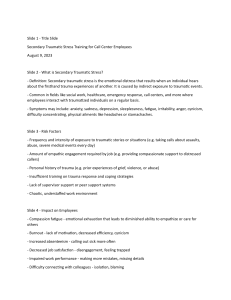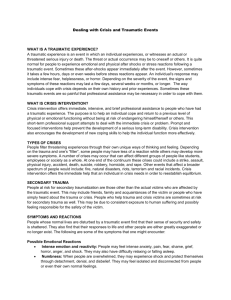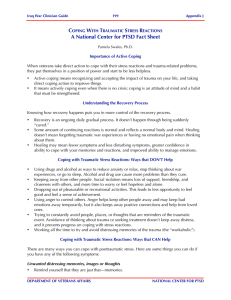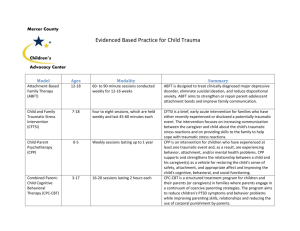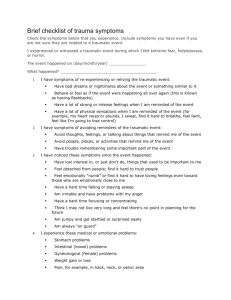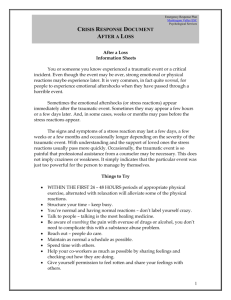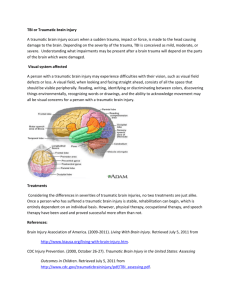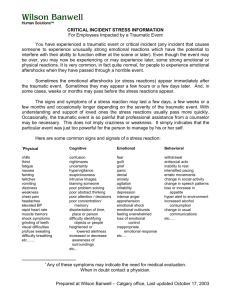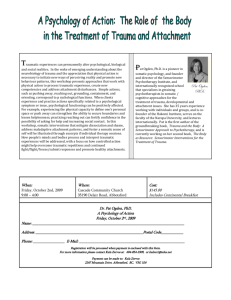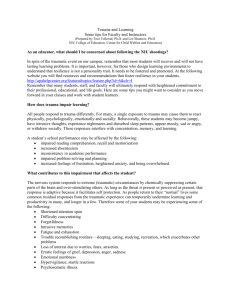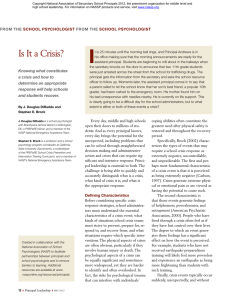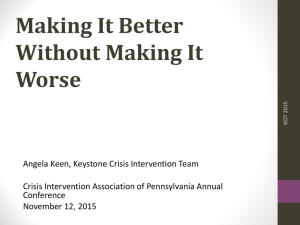Traumatic Events in the Workplace
advertisement
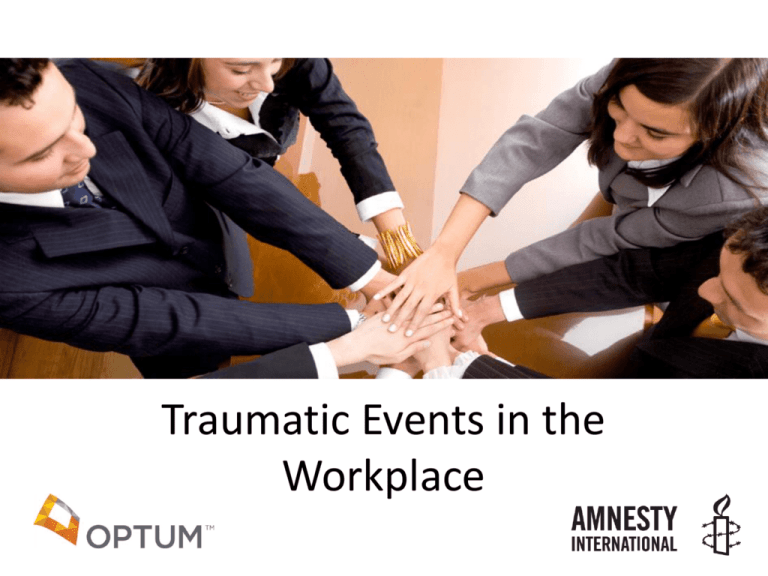
Traumatic Events in the Workplace What is a Traumatic Event? A traumatic event is any event with sufficient impact to produce significant emotional reactions in people now or later. It is an event which is considered generally outside the range of ordinary human experiences. (Mitchell and Everly, 2014) • It is an experience that is outside the range of our normal day to day living, and of such a nature that it would cause significant stress to almost anyone. • Post Traumatic Stress (PTS) is our ‘normal’ reaction to an ‘abnormal event • It is now generally accepted that a critical incident need not be personally life threatening, but such that it threatens the emotional and psychological wellbeing of the individual/s involved. Normal Reactions to Traumatic Events • • • • • • Change in Sleep Pattern Nightmares Easily startled Fatigue/ Exhaustion Hyperactivity/ Underactivity Health problems- skin rashes, headaches • Trembling, lack of coordination • • • • • Thinking about things Difficulty concentrating/ decision / making Memory Disturbance Inability to attach any importance to anything other then the incident (rumination) Trouble Managing Feelings Signs and Symptoms • Physical – increased heart rate, dizziness, headaches, increased blood pressure, etc. • Emotional – variable mood, anger, emotional distress, etc. • No time for self or others – withdrawal, isolation. • Stress symptoms. Long Term Exposure to Traumatic Events Contributing factors Some individuals have a genetic predisposition to mental health problems, meaning that there is a strong familial history which predisposes a person to develop a mental health disorder. However, a genetic predisposition for will not necessarily lead to a mental illness. Lifestyle of a person can contribute for example: burning the candle at both ends, not taking time to relax and re-cooperate. For some where there is pre-existing mental health problems such as depression or anxiety where we see there symptoms elevate following trauma. Those who are already experiencing existing high level stress can also be impacted more severely. Where an individual has previously experienced trauma they are at risk of developing significant symptoms due to a previous trauma being triggered. Those with drug and alcohol problems may find that they reach for these methods to avail dealing with the effect of the trauma, therefore compounding the problem. Certain personality types deal with trauma better then others. People who are anxiety prone, tend to worry or have an obsessive/ perfectionist nature, are more likely to have severe stress reactions. People with strong personal support systems cope better with a crisis, but a key factor is the more control people feel they have in a crisis situation the less trauma they tend to experience. Role of Managers • Information Gathering - Information to determine immediate needs & concerns • Practical Assistance - Mobilise pre -appointed staff to help address immediate needs & concerns. WHS, HR, Counsellor • Connection with Social Supports - Help establish brief or ongoing contact with primary support persons and friends on site and families at home – Provide respite for staff – Set realistic workloads – Provide enough qualified supervision – Acknowledge the severity and pervasiveness of staff’s traumatic experiences and their after-effects. – Encourage staff to identify and address signs of trauma – Provide opportunities for continuing education – Provide time-out, sufficient vacation time. – Support personal change and development for staff. – Managers to observe changes in behaviour, attitudes and beliefs. – Greater promotion of EAP – Extend/customise the EAP as required Role of Peers • Contact & Engagement - Respond in a nonintrusive, compassionate & helpful manner • Safety & Comfort - Provide immediate & ongoing safety and physical & emotional comfort • Stabilisation (if needed) - calm and orient those who are overwhelmed & distraught Role of Counsellors, WHS Reps, HR • Information on Coping - Provide information on coping, including education about stress reactions & coping • Linkage with Collaborative Services - Link with appropriate services & providing information about other internal and external services that may be needed in the future. This may include referral into EAP counselling. Aim of Intervention Psychological First Aid (PFA) is about helping adults and families in the immediate aftermath of an incident. PFA is designed to reduce the initial distress and to foster short- and long-term adaptive functioning and coping. • To give closure to the event • Provide framework for recovery • Normalise the reactions experienced • Provide accurate information • Enable understanding & process the event • Re-establish coping strategies • Facilitate return to normal routine and functioning You don’t have to be a counsellor to provide PFA Protective Factor - Resilience The ability to recover from illness, change or misfortune; buoyancy Being able to resume an original shape or position after being bent, stretched or compressed Resilience defined • If our lifestyle creates pressures with which our body and brain cannot cope, we can reach an ‘elastic limit’. And just like an elastic band breaks when stretched too far, we too can experience changes which are irreversible (such as health problems, relationship breakdowns or loss of employment) if pushed beyond our ‘elastic limit’. • The challenge is to optimise brain and body to cope with the environmental demands of both success and failure, so that you can maintain an enduring sense of wellness. – The ability to bounce back or recover from stressful situations – The ability to take on challenges, and find meaning in them – Being able to respond positively to difficult situations – Learning and growing through various experiences in life/ Rising above adversities – Transforming unfavourable situations into wisdom, insight and compassion – To be able to cope when things look bleak/ Being able to tap into hope – Being able to forgive Protective Factor - Resilience Resilience is a protective factor relating to exposure to a traumatic event. It is about positive and successful coping. It is about persistence, adaptation, and capacity for success despite adverse events and environments. Resiliency starts before a traumatic event. It strengthens the individual at key turning points throughout his or her life. It is an active, optimistic approach to problem solving Internal locus of control - belief in one self It is an ability to engage positively with others A capacity to understand and regulate emotion A capacity to learn and adapt from experience Support and good relationships are essential Self Care: Work Out Stations Kash Thompson EAPAA Conference 2008 Intellectual – Review Station Social – Relational Station Work it Out Emotional – Spiritual Station Physical – Physiological Station Social – Relational Station Self Care Strategies: • Establish peer and social support • Regular defusing/ discussion • Good relations with others • Social life (weekly) • Ability to communicate your needs • Ability to say no (or yes with conditions) • Asking for help How do I rate myself on the above? 0 - - - - - - 5 - - - - - - 10 Bad Average Good Intellectual- Review Station Self Care Strategies: • Understanding self-care principles • Knowing/ accepting my limits • A way to maintain positive self talk • Stopping to review my needs (set dates) • A way of benchmarking myself How do I rate myself on the above? 0 - - - - - - 5 - - - - - - 10 Bad Average Good Physical- Psychological Station Self Care Strategies: • Satisfactory sleep • Balanced diet • Regular physical exercise • Appropriate use of alcohol • Regular medical check up • A form of recreation (weekly) How do I rate myself on the above? 0 - - - - - - 5 - - - - - - 10 Bad Average Good Emotional- Spiritual Station Self Care Strategies • Ability to relax and create calm • Knowing my frustration “triggers” • Managing my frustration well • Ability to express emotions appropriately • Sense of connection to my higher purpose • I can separate myself from other’s strong emotions or distress How do I rate myself on the above? 0 - - - - - - 5 - - - - - - 10 Bad Average Good Self Assessment Yes / No • • • • • • • • • • Do you have a supportive network X 5? Do you have a hobby? Do you belong to a social group or activity group? Do you practice (some form of relaxation e.g. yoga, meditation)? Do you exercise for at least 20 minutes three times a week? Do you do something ‘just for yourself’ that you really enjoy? Have you attended a stress management course? Do you have a set of short term and long term goals? Do you recognise and deal with stress related symptoms ASAP? Do you know how to contact your EAP Provider? What is your Score? When and Where to Get Assistance Employee Assistance Program Phone: 1300 366 789 Free, easily accessible, Staffed by Short term highly voluntary and counselling and experienced, confidential support for all service that can professionally employees and qualified provide support their family for personal or psychologists or members work-related social workers issues Life isn’t about living without problems. Life is about solving problems. Tom Krause born 1934- Finnish Opera Singer
